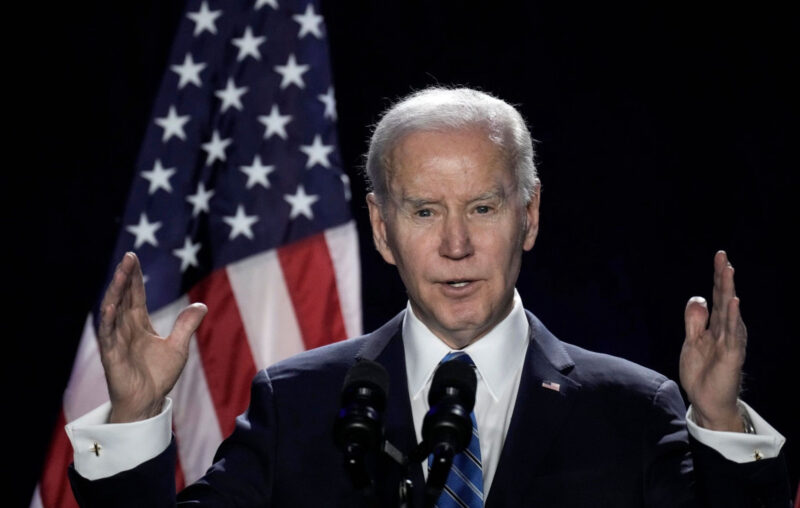


As an academic economist, my job is to pursue the truth, so I am always flummoxed by the rhetoric coming out of that great regulatory factory on the Potomac, belching negative externalities that gum up the economy. In 2000, I chided the Trump-led CARES Act as a stimulus bill that wasn’t. Only about 20 percent of the $2 trillion bill was targeted at health measures (and it’s unclear what percentage of that was actually targeted at COVID); another 30 percent involved welfare relief that was barely means-tested, and smelled, along with the remaining and murky 50 percent, like election-year pork. Most importantly, the Act did nothing to ease the COVID-era supply-side problems, as it failed to target regulation and other barriers to commerce.
In 2021, the Biden administration followed suit with ARPA, which spent another $2 trillion. Of that, less than10 percent was dedicated to public health, 40 percent to direct payments (including checks for a whopping 85 percent of American households), 25 percent to stimulate an economy that wasn’t in recession, and the rest a grab bag of federal handouts. Over the span of a year, the Trump and Biden administrations oversaw the spending of an additional $5 trillion beyond an already-bloated budget. After a flurry of other enormous spending bills pushed by the Biden administration, we now have the proposed 2024 Biden budget. In the White House’s own words, the budget isn’t just a spending proposal, but the President’s “vision to build on the work this Administration has done to make a real difference in people’s lives.” The budget proposal is full of class warfare, contradictions, and empty rhetoric.
It is tempting to start with a constitutional argument. First, there is nothing in Article II of the Constitution that grants the President the power to propose legislation and spending (which, in effect, is what the proposed budget does). At best, the President, in his State of the Union address to Congress may “recommend to their Consideration such Measures as he shall judge necessary and expedient.” The very idea that the executive – meant to execute the laws, and not write them – should propose a budget comes close to violating Article I, section 7, which states that “All Bills for raising Revenue shall originate in the House of Representatives.” Second, there is a world of difference between the goals of that $6.8 trillion and the limited powers (fewer than 20) enumerated in Article I, section 8. But, these days, arguments for actually reading the Constitution seem to fall somewhere between quaint and antiquated.
In proposing $6.8 trillion of spending over 184 pages, the budget has a few provisions that stand out:
- Implement a 25 percent minimum tax on billionaires
- Increase the top marginal tax rate from 37 percent to 39.6 percent
- Increase in the corporate tax rate from 21 percent to 28 percent
- Bolster Medicare and Social Security through special taxes
- Create troubling industrial policy, especially in infrastructure and technology
The substance and rhetoric of the proposed budget are troubling. In typical election-year class warfare, the Biden administration is proposing a raft of new taxes to make sure “the wealthy” pay their “fair share.” The administration wants to accomplish this through a “billionaire minimum tax” of 25 percent on all income, including adjustments to the capital gains tax, and by increasing the top marginal tax rate from 37 percent to 39.6 percent. If we look behind the rhetoric, we will see that as of 2020 (the most recent year for which figures are available), the top 1 percent of taxpayers pay 42 percent of total tax revenue; the top 5 percent pay 63 percent, and the top 10 percent pay 74 percent of total revenue. If anything, Americans with higher income are already paying more than their “fair share.” On a related note, it is troubling for the health of a democracy that the top 50 percent of taxpayers accounts for 98 percent of revenue. Effectively, this means that half the taxpayers are not participating financially in the federal budget, yet face incentives at the ballot box to push for more spending. Alas, while this may be an existential crisis for a democracy, it does not make for good electoral politics.
The Biden administration is evincing a major cognitive disconnect when it comes to competitiveness. On one hand, the administration created a Competition Council in 2021, through an executive order (EO 14036 of July 2021), with 72 initiatives and mandates to 14 government agencies to increase US competitiveness. On the other, the administration has consistently been increasing regulation, advancing the weight of government in the economy, pushing for a national minimum wage increase, and increasing the federal minimum wage by executive order. In this budget proposal, the administration is doubling down on its anti-competitive actions, not just through individual income tax increases, but also by proposing a significant jump in the corporate tax, which will hurt American competitiveness. As a small-but-typical indicator, the budget simultaneously attempts to raise taxes on oil companies and to lower energy costs for consumers.
In its marketing of the proposed budget, the White House is proudly crowing that the budget will “cut the deficit by nearly $3 trillion over 10 years.” Unfortunately, this is all smoke and mirrors – and rather disingenuous. The deficit, an annual measure of the difference between revenue and outlay, is ultimately irrelevant. What matters is the national debt, which currently stands at $31.6 trillion, or about 125 percent of GDP. A smaller deficit is nice, but the Biden budget does not lower the national debt, which continues to increase a breakneck speed, due to debt servicing and continued federal profligacy. The Biden budget would in fact increase the national debt by about $17 trillion over the next decade (see Table S-1 in the proposed budget). A small annual decrease in the rate of growth of the national debt is no consolation.
Before COVID, federal spending stood at about 20 percent of GDP, then temporarily peaked at about 30 percent of GDP, with the massive Trump-Biden spending bills. The Biden budget now proposes federal expenditures of about 25 percent of GDP – lower than the COVID-era frenzy, but higher than pre-COVID spending. This is a move in the wrong direction, and a classic example of the ratchet effect described by economist Robert Higgs: “once a crisis has passed, state power usually recedes again, but it rarely returns to its original levels; thus each emergency leaves the scope of government at least a little wider than before.” One is reminded of George Orwell’s 1984 (part 1, chapter 4):
It appeared that there had even been demonstrations to thank Big Brother for raising the chocolate ration to twenty grammes a week. And only yesterday […] it had been announced that the ration was to be REDUCED to twenty grammes a week. Was it possible that they could swallow that, after only twenty-four hours? Yes, they swallowed it. […] The eyeless creature at the other table swallowed it fanatically, passionately, with a furious desire to track down, denounce, and vaporize anyone who should suggest that last week the ration had been thirty grammes.
Beyond tired class warfare rhetoric and anti-competitive measures, the Biden administration is attempting to increase not only the size of the state (through more taxing and spending), but also the scope of the state, through misguided commercial and industrial policy.
The good news is that the budget is unlikely to pass through a divided Congress. The bad news is that this proposed budget is further confirmation of the Biden administration’s fatal conceit that it can run the economy. The worse news may be that Congress doesn’t come up with anything substantively better.
TELL YOUR FRIENDS ABOUT CITIZENS JOURNAL Help keep us publishing –PLEASE DONATE




